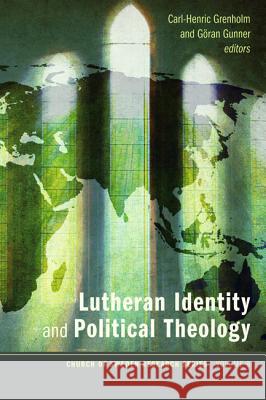Lutheran Identity and Political Theology » książka
Lutheran Identity and Political Theology
ISBN-13: 9781625648907 / Angielski / Miękka / 2014 / 254 str.
Lutheran Identity and Political Theology
ISBN-13: 9781625648907 / Angielski / Miękka / 2014 / 254 str.
(netto: 141,51 VAT: 5%)
Najniższa cena z 30 dni: 146,94
ok. 16-18 dni roboczych.
Darmowa dostawa!
Lutheran tradition has in various ways influenced attitudes to work, the economy, the state, education, and health care. One reason that Lutheran theology has been interpreted in various ways is that it is always influenced by surrounding social and cultural contexts. In a society where the church has lost a great deal of its cultural impact and authority, and where there is a plurality of religious convictions, the question of Lutheran identity has never been more urgent. However, this question is also raised in the Global South where Lutheran churches need to find their identity in a relationship with several other religions. Here this relationship is developed from a minority perspective. Is it possible to develop a Lutheran political theology that gives adequate contributions to issues concerning social and economic justice? What is the role of women in church and society around the world? Is it possible to interpret Lutheran theology in such a way that it includes liberating perspectives? These are some of the questions and issues discussed in this book. ""Informed and calibrated by Lutheran Reformation insights, this collection of essays by North American and Scandinavian scholars shows that Lutheran theology can tackle important issues among denominations and in society. The reader is confronted here with a plethora of insights into the relevance of Lutheran theology on a global scale."" --Hans Schwarz, Regensburg University, Regensburg, Germany ""On the contemporary scene, religion becomes increasingly more globalized. These contributions reflect the global character of contemporary Lutheranism. We are presented with a rich collection of essays that discusses a wide variety of issues, ranging from religion in society and culture, to gender, health, sex, and politics. This volume shows how a distinct Lutheran theological identity takes the contemporary world seriously."" --Jan-Olav Henriksen, Norwegian School of Theology, Oslo, Norway ""Lutheran identity is in transition in a world of rapid changes. Old Lutheran land becomes multicultural. New Lutheran churches find their own ways. This book displays a broad spectrum of twenty-first-century Lutheran identity from both the South and the North. It follows a new trend of rethinking Lutheran political theology, going far beyond mere repristination, of interest for anyone concerned about theology, politics, and the ambiguities of life."" --Bo Kristian Holm, Aarhus University, Aarhus, Denmark Carl-Henric Grenholm is Senior Professor of Ethics at the Department of Theology, Uppsala University, Sweden. Goran Gunner is Associate Professor in Mission Studies, Uppsala University, and Researcher at Church of Sweden Research Unit.
Lutheran tradition has in various ways influenced attitudes to work, the economy, the state, education, and health care. One reason that Lutheran theology has been interpreted in various ways is that it is always influenced by surrounding social and cultural contexts.In a society where the church has lost a great deal of its cultural impact and authority, and where there is a plurality of religious convictions, the question of Lutheran identity has never been more urgent. However, this question is also raised in the Global South where Lutheran churches need to find their identity in a relationship with several other religions. Here this relationship is developed from a minority perspective.Is it possible to develop a Lutheran political theology that gives adequate contributions to issues concerning social and economic justice? What is the role of women in church and society around the world? Is it possible to interpret Lutheran theology in such a way that it includes liberating perspectives? These are some of the questions and issues discussed in this book.""Informed and calibrated by Lutheran Reformation insights, this collection of essays by North American and Scandinavian scholars shows that Lutheran theology can tackle important issues among denominations and in society. The reader is confronted here with a plethora of insights into the relevance of Lutheran theology on a global scale.""--Hans Schwarz, Regensburg University, Regensburg, Germany""On the contemporary scene, religion becomes increasingly more globalized. These contributions reflect the global character of contemporary Lutheranism. We are presented with a rich collection of essays that discusses a wide variety of issues, ranging from religion in society and culture, to gender, health, sex, and politics. This volume shows how a distinct Lutheran theological identity takes the contemporary world seriously.""--Jan-Olav Henriksen, Norwegian School of Theology, Oslo, Norway""Lutheran identity is in transition in a world of rapid changes. Old Lutheran land becomes multicultural. New Lutheran churches find their own ways. This book displays a broad spectrum of twenty-first-century Lutheran identity from both the South and the North. It follows a new trend of rethinking Lutheran political theology, going far beyond mere repristination, of interest for anyone concerned about theology, politics, and the ambiguities of life.""--Bo Kristian Holm, Aarhus University, Aarhus, DenmarkCarl-Henric Grenholm is Senior Professor of Ethics at the Department of Theology, Uppsala University, Sweden.Goran Gunner is Associate Professor in Mission Studies, Uppsala University, and Researcher at Church of Sweden Research Unit.











